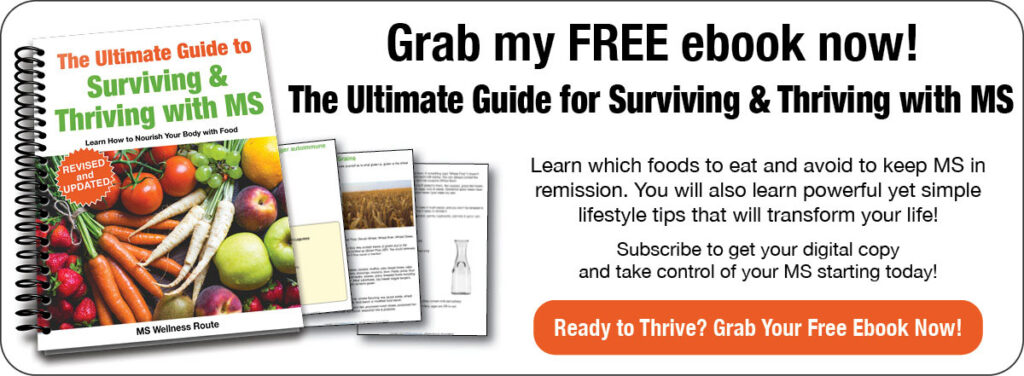Last Updated on November 17, 2023 by Cathy

Multiple sclerosis (MS) is an inflammatory demyelinating disease of the central nervous system. It is the most common non-traumatic neurological disease in young adults. Nearly one million people in the U.S. and 2.8 million people worldwide are living with MS.
Mitochondria is the powerhouse of the body which is in nearly every cell. Cells in the brain, heart, muscles, nerves, and organs have more mitochondria. In people with MS, these cells become damaged.
Eating a poor diet can result in inflammation, mitochondrial damage, and pain. The standard American diet (SAD) leads to inflammation, chronic diseases, and mitochondrial damage. A clean, healthy diet supports a healthy mitochondrial and improves MS symptoms. It also helps slow the aging process which we all hope for.
How to reverse MS:
- Calorie restriction (fasting)
- Curcumin (a spice)
- Docosahexaenoic acid (DHA) is an omega-3 fatty acid found in fatty fish such as salmon and seaweed
- Exercise, my favorite is OptimalBody Personal Fitness
- Meditation
- Reducing stress
- Stimulate your brain by learning something new or playing games that make you think
It is always best to get your nutrients from food but you can also take supplements. For curcumin I recommend CurcumRx and for DHA I recommend Omega Plus.
A proper balance of essential nutrients is critical for maintaining healthy mitochondria. Eating an anti-inflammatory diet designed to fit your needs is the best choice to fight your MS.
An anti-inflammatory diet includes:
- Dairy-free
- Gluten-free
- High-quality fats
- Lots of vegetables
- Low glycemic (low carb)

Epstein-Barr Virus and MS
A 20-year study found Epstein-Barr Virus (EBV) as the cause of MS. However, 95% of all adults have EBV and only a small percentage have MS. This proves EBV is not the only factor causing MS.
Researchers believe it may have something to do with the HLA-DR gene. Having the HLA-DR gene increases a person’s risk of MS and fungi infections. For decades doctors suspected fungi infections as a cause of MS.
Infections such as Candida, EBV, and mycotoxins (mold) feed on sugar. It’s not just sugar found in food, it also includes high blood sugar. Eating a low-carb diet and keeping your stress down lowers your overall blood sugar. You should aim for 5.3 or lower.
You can get a blood test called A1C which shows your average blood sugar level from the past 3 months. It’s also an indicator of diabetes or how well a person is managing their diabetes. I use an online lab called Walk-In Lab to get my A1C blood test. My last result was 5.0 which is excellent. See the image below.

A1C scale:
- Optimal = below 5.4
- Normal = below 5.7
- Prediabetes = 5.7-6.4
- Diabetes = above 6.4
The Perfect Diet for People With MS
There are many diets for MS but everyone’s circumstance is different so there is no perfect diet for MS. But, you can create the perfect diet to fit your needs using an anti-inflammatory diet as your basis. I follow a paleo-based but altered it to be lower in histamines and fungi.
First, eat a nutrient-dense diet with mostly vegetables. For each meal include macronutrients (proteins, fats, and carbohydrates). Macro means most. Your body needs mostly macronutrients.
Micronutrients are where you get your vitamins and minerals. You don’t need as many micronutrients as macronutrients but they are just as important. Eating a wide range of foods will provide plenty of vitamins and minerals your body needs.
Macronutrients = big
Micronutrients = small
Other Important Nutrients for MS

There are other nutrients that are important for an MS diet. Including antioxidants, B vitamins, and coenzyme Q10 (CoQ10). Phytonutrient-rich (colorful) vegetables and fruits supply many of these nutrients.
Antioxidants are compounds that prevent oxidation which can produce free radicals. Free radicals damage cells by overwhelming the body’s antioxidant defense. Studies connected oxidative stress with central nervous system diseases such as MS.
Foods high in antioxidants include:
- Artichokes
- Blackberries
- Blueberries
- Broccoli
- Dark chocolate
- Cherries
- Cranberry
- Grapes
- Green tea (it’s not a food but it’s very high in antioxidants)
- Huckleberries
- Kale
- Orange
- Pecans
- Plums
- Raspberries
- Red cabbage
- Spinach
- Strawberries
- Sweet potatoes

B vitamins make sure the cells are functioning properly. Studies show that B vitamins are important for myelin health. A deficiency can cause a neurological decline. Vitamin B12 is especially important for rebuilding myelin.
Foods high in B vitamins:
- Asparagus
- Avocado
- Bananas
- Beef
- Broccoli
- Chicken
- Clams
- Egg
- Liver
- Mussels
- Nuts
- Oysters
- Pork
- Salmon
- Spinach
- Sunflower seeds
- Tuna
CoQ10 is a fat-soluble vitamin your body stores in the mitochondria of your cells. It protects your cells from free radical damage. MS lowers your CoQ10 levels so it is important to include foods with CoQ10. Adequate CoQ10 levels slow the progression of MS.
Foods high in CoQ10:
- Avocado
- Beef
- Broccoli
- Cauliflower
- Chicken
- Fatty fish like mackerel, sardines, and trout
- Organ meats
- Oranges
- Pistachios
- Pork
- Sesame seeds
- Spinach
- Strawberries
Foods to Avoid

Avoid all dairy products. Studies found women who drank more cow’s milk had more MS flares. Countries that consumed more dairy had higher rates of MS. And, casein causes myelin damage in people with MS.
Avoid gluten. Gluten causes intestinal inflammation, it also causes a leaky gut. Grains can sometimes cause a cross-reaction so it’s best to avoid grains until you’ve healed your gut. Afterward, reintroduce grains one at a time to make sure your body doesn’t continue to react to them. If your body doesn’t react you can add it back to your diet. If your body has a bad reaction you need to avoid it forever.
Avoid legumes. Beans are a good source of protein but they contain lectins. Lectins are a type of protein that binds to certain carbohydrates. This can lead to digestive issues which studies show is a problem in MS patients. Avoid foods high in lectins including beans, peanuts, and soy.
Green beans and peas also have lectins but at a much lower percentage. The autoimmune protocol (AIP) used to have people avoid them but now says they’re okay to eat. It is up to you whether you want to include them in your diet or not.
Food Sensitivities
Also, avoid any foods you have a sensitivity to. You may need to try an elimination diet to find which foods are causing a problem. This is how I found out I was sensitive to chipotle, sweet peppers, and tomatoes. All of these are in the nightshade family.
Sometimes a person is sensitive to “healthy” food which makes it harder to find. This also happened to me. After getting a food sensitivity test (not a food allergy test) I discovered I was sensitive to many foods. Including arugula, avocados, cocoa beans (chocolate), coconut, and more.
If you would like to get tested talk to your doctor about a food sensitivity test (IgG antibody). Or use an at-home test such as Everlywell Food Sensitivity Test.
Quick Links To Information In This Post:
How to Create the Perfect Diet for MS
Now that you have the basics down on what to eat and what to avoid, it’s time to put it all together. Next week I will walk you through meal planning so be sure to come back.

Free Wellness Library!
Subscribe for free and I’ll send you the password to my secret library filled with many printables for your wellness journey.
Want to remember this health tip? Pin it to your Pinterest board!

Photos by Alesia Kozik, Aphiwat chuangchoem, cottonbro, and Lisa Fotios from Pexels
Resources:
https://www.sciencedaily.com/link-between-diet-epstein-Barr
https://www.sciencedirect.com/science/effects-of-b-vitamins-in-patients-with-multiple-sclerosis
How To Create The Perfect Diet for MS





